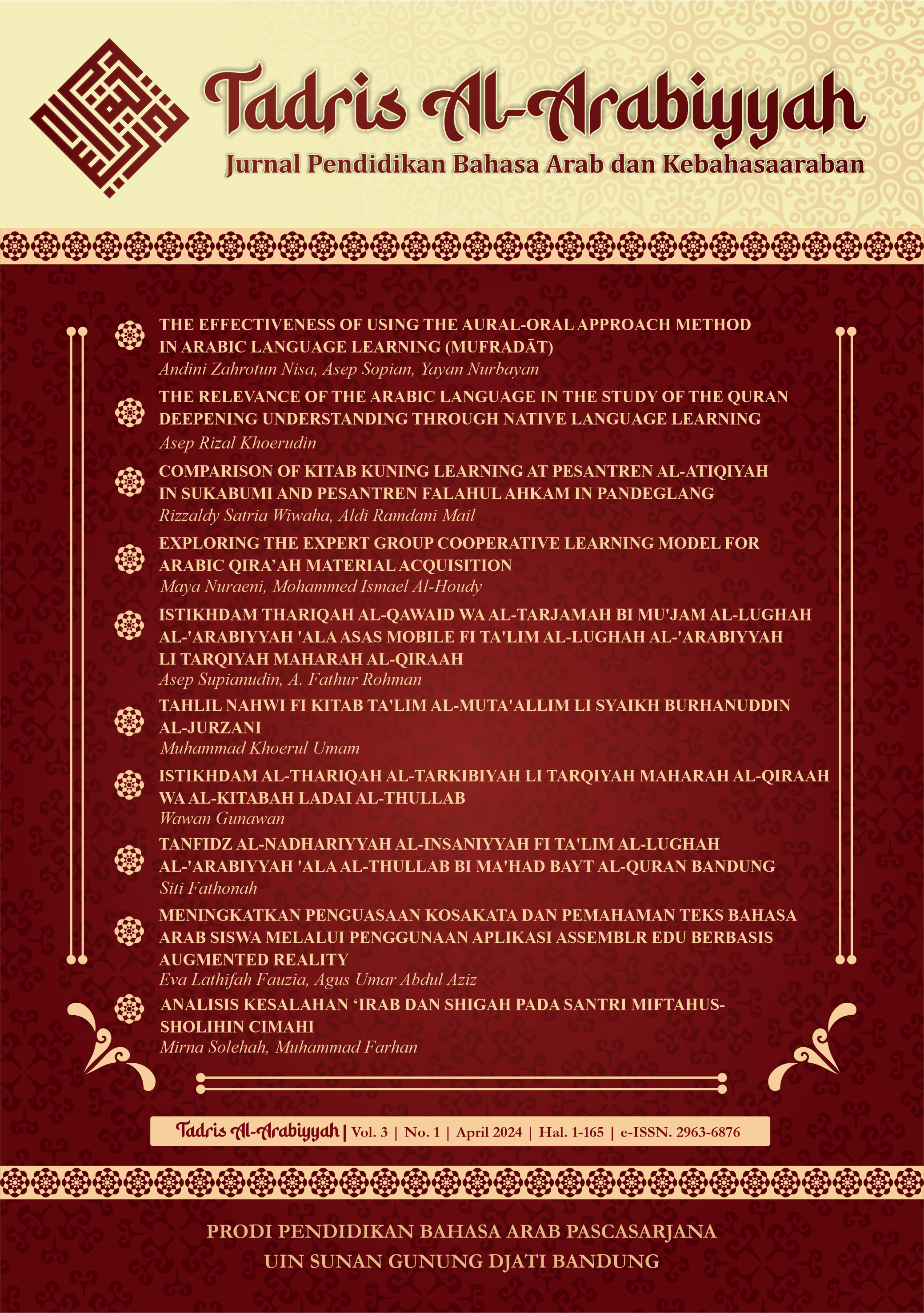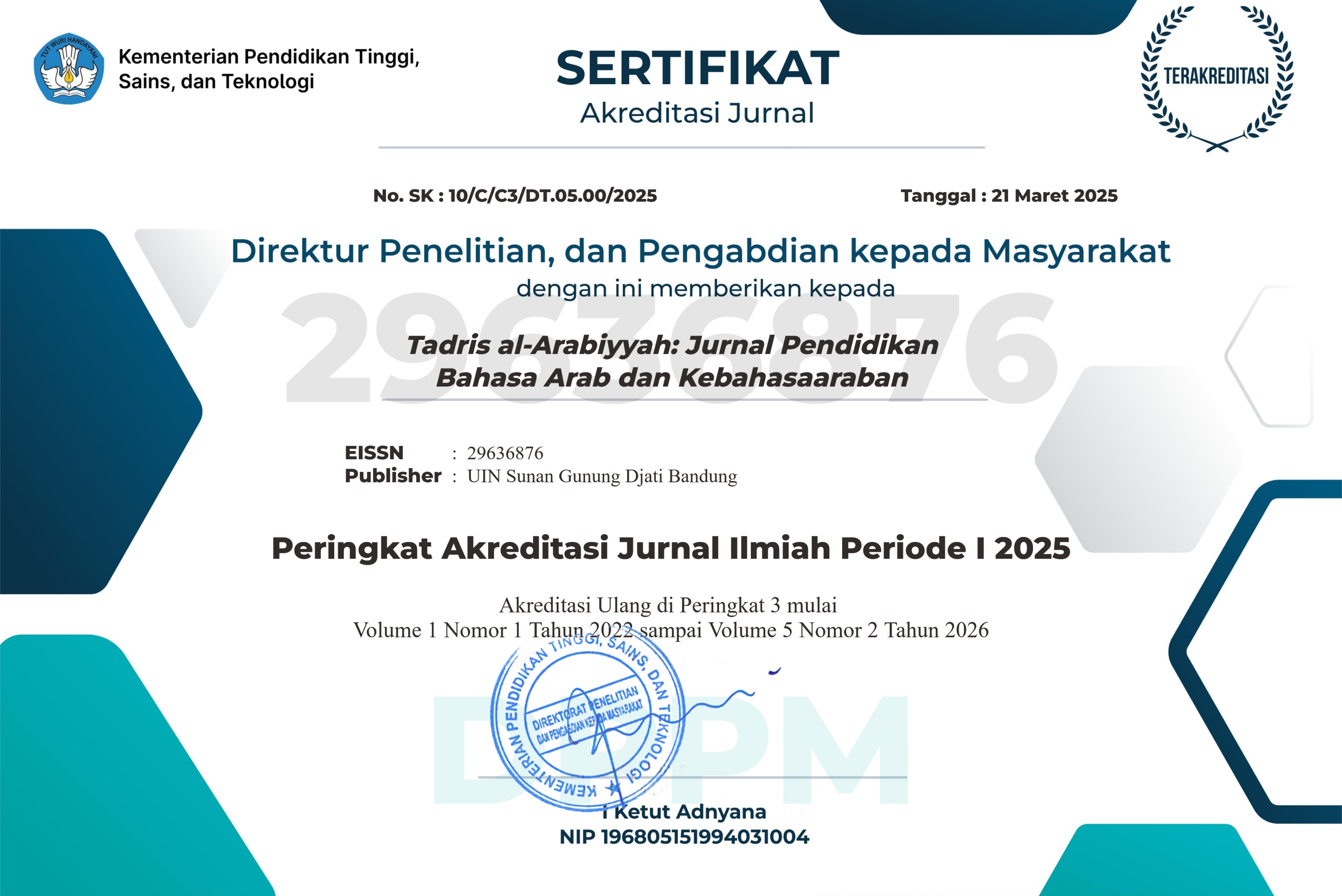Exploring the Expert Group Cooperative Learning Model for Arabic QirÄ’ah Material Acquisition
DOI:
https://doi.org/10.15575/ta.v3i1.34549Abstract
Students' ability to pronounce sentences and determine meaning is still an obstacle in learning to read linguistic and non-linguistic Arabic. This study aimed to determine how effectively students learn to read before and after using the "Expert Group" method for class VIII students at MTs Plus Al Fath Klaten. The method used in this research is a quasi-experimental method with one one-group design that compares the pre-test and post-test. Data collection methods include observation, interviews, tests, and documentation. The sample in this study was class VIII, with a sample of 22 students and a pre-test and post-test design. The results of this study indicate that the ability to learn qiraah before applying the Expert Group method is amply demonstrated by obtaining an average score of 75.9 consisting of (70-80) on standard interpretation. The ability to learn qiraah after applying the Good Expert Group method of students is demonstrated by obtaining an average score of 89.5 consisting of (80-90) on standard interpretation. There is an increase in the ability to learn qiraah after applying the Expert Group method, which can be seen from the increase in the post-test by indicating the N-Gen of 0.69 or 69%. That is the increase in students' abilities in qiraah learning after applying the Expert Group method shows while in the interpretation of an interpretation.
References
Amalia, N. (2022). Penggunaan Metode Expert Group Bagi Peningkatan Keterampilan Membaca: Studi Quasi Experiment pada Siswa Kelas VIII A di SMP Islam Nuurushshibyan Bogor [Skripsi]. UIN Sunan Gunung Djati Bandung.
Christensen, J., & Hesstvedt, S. (2024). The Influence of Expert Groups: A Citation Analysis. Journal of European Public Policy, 31(5), 1259–1294. https://doi.org/10.1080/13501763.2023.2174168
Fitriyah, T., & Fauzi, M. F. (2020). Improving Quality of Arabic Translation Course Through Jigsaw Cooperative Learning. Izdihar: Journal of Arabic Language Teaching, Linguistics, and Literature, 3(1), 17–30. https://doi.org/10.22219/jiz.v3i1.11033
Husna, I., Azkiya, H., Febriani, S. R., Rahmawati, R., & Kustati, M. (2022). The Analysis of Arabic Language Textbooks for Class II Elementary School. Lectura: Jurnal Pendidikan, 13(2), 234–245. https://doi.org/10.31849/lectura.v13i2.10417
Jannah, I. M. (2018). Pembelajaran Bahasa Arab dengan Menggunakan Model Cooperative Learning. Modeling: Jurnal Program Studi PGMI, 5(1), 10–24. https://doi.org/10.36835/modeling.v5i1.205
Junaedi, D., Sahliah, S., Kamaluddin, T., & Rukanda, N. (2022). Pengembangan Metode Expert Group Berbantuan Quiziz dalam Meningkatkan Pembelajaran Matakuliah PAI pada Mahasiswa PGSD IKIP Siliwangi. COLLASE (Creative of Learning Students Elementary Education), 5(2), 217–224. https://doi.org/10.22460/collase.v5i2.10248
Kurniati, A., & Irawati, R. P. (2015). Efektivitas Metode Expert Group dan Model Lomba Cerdas Cermat (LCC) Bagi Peningkatan Keterampilan Membaca Bahasa Arab Siswa Kelas XI MAN Kendal. Lisanul Arab: Journal of Arabic Learning and Teaching, 4(1), 49–55. https://doi.org/10.15294/la.v4i1.7633
Marougkas, A., Troussas, C., Krouska, A., & Sgouropoulou, C. (2023). Virtual Reality in Education: A Review of Learning Theories, Approaches and Methodologies for the Last Decade. Electronics, 12(13), 2832. https://doi.org/10.3390/electronics12132832
Mei, S. Y., Ju, S. Y., & Mohd, A. B. (2022). Cooperative Learning Strategy in Teaching Arabic for Non Native Speakers. Humanities Today: Proceedings, 1(2), 112–120. https://doi.org/10.26417/ejser.v11i2.p261-266
Munawaroh, S. (2016). Model Pembelajaran Kooperatif (Cooperative Learning) Dalam Strategi Belajar Mengajar Bahasa Arab. Prosiding Konferensi Nasional Bahasa Arab, 1, 30–54. Retrieved from https://prosiding.arab-um.com/index.php/konasbara/article/download/35/30
Murdani, M., Muhammad, M., Amin, B., Ulfa, M., & Haikal, M. (2019). Use of Cooperative Learning Methods STAD Strategies to Improve Students’ Abilities in Qira’ah (Experimental Research in Ma’had Al-Uluum Ad-Diniiyati Al-Islaamiyyati Samalanga). Budapest International Research and Critics in Linguistics and Education (BirLE) Journal, 2(1), 38–49. https://doi.org/10.33258/birle.v2i1.184
Mustiah, M., Dayat, D., & Sadek, N. (2024). The Impact of Mobile-Assisted Hybrid Dynamic Assessment on Arabic Language Leaners’ Reading Comprehension Performance. Journal of Languages and Language Teaching, 12(1), 524–534. https://doi.org/10.33394/jollt.v12i1.9158
Noor, F., Jainah, N., Anwar, M., Darmawaty, R., & Muhmood, M. F. A. (2023). The Implementation of Cooperative Learning Method for Arabic Language Learning. Arabiyatuna: Jurnal Bahasa Arab, 7(2), 589–610. http://dx.doi.org/10.29240/jba.v7i2.6791
Nugrawiyati, J. (2017). Cooperative Learning dalam Pembelajaran Bahasa Arab Berbasis Kurikulum 2013. Al-Murabbi: Jurnal Studi Kependidikan Dan Keislaman, 3(2), 142–158. Retrieved from http://ejournal.kopertais4.or.id/mataraman/index.php/murabbi/article/view/2587/1902
Nurabianti, A., & Farah, R. R. (2024). The Use of Arabic Sound in Teaching English Pronunciation Through Flashcard: Research and Development. Journal of Languages and Language Teaching, 12(1), 168–182. https://doi.org/10.33394/jollt.v12i1.9322
Omar, T. (2017). Culture and Second Language Aquisition: Arabic Language as a Model. European Scientific Journal, ESJ, 13(2), 159–166. https://doi.org/10.19044/esj.2017.v13n2p159
Primaningtyas, M. (2016). Penerapan Cooperative Learning “Student Team Achievement Division†Dalam Pembelajaran Bahasa Arab. Al-Manar: Jurnal Komunikasi Dan Pendidikan Islam, 5(2), 143–161. https://doi.org/10.36668/jal.v5i2.36
Rohman, H., & Rosyadi, F. I. (2021). Pengembangan Bahan Ajar Bahasa Arab Berbasis CEFR Untuk Meningkatkan Keterampilan Bahasa Arab Siswa. Al MahÄra: Jurnal Pendidikan Bahasa Arab, 7(2), 163–183. https://doi.org/10.14421/almahara.2021.072-01
Rorimpandey, W. H. F., Maaluas, F., Mangangantung, J., & Suryanto, H. (2022). The Student Teams Achievement Divisions Learning Model in Its Influence on the Motivation and Science Learning Outcomes of Elementary School Students. Journal of Innovation in Educational and Cultural Research, 3(3), 345–354. https://doi.org/10.46843/jiecr.v3i3.72
Sholihah, H. (2023). Implementasi Model Cooperative Learning Tipe Jigsaw dalam Pembelajaran Bahasa Arab di Kelas XII Agama MAN 1 Gresik. Tatsqifiy: Jurnal Pendidikan Bahasa Arab, 4(1), 63–75. https://doi.org/10.30997/tjpba.v4i1.7108
Sutarjo, J. (2022). Fa’aliyah Istikhdam Namudzaj At-Ta’lim At-Ta’awuni Bi Nau’i Mu’adlilah Al-Kalimat Li Tarqiyah Isti’ab Al-Mufradat. An Nabighoh, 24(2), 143–154. https://doi.org/10.32332/an-nabighoh.v24i2.5264
Syaifullah, M. (2017). Pembelajaran Metode Kooperatif Tipe Jigsaw Dalam Meningkatkan Hasil Belajar Bahasa Arab (Qowa’id) Mahasiswa Perbankan Syari’ah IAIM NU Metro Lampung Tahun 2017. Jurnal Bahasa Lingua Scientia, 9(2), 177–208. https://doi.org/10.21274/ls.2017.9.2.177-208
Utami, R. (2020). Ta’lÄ«m Al-Nahw Bi Madkhal Al-Ta’allum Al-Ta’ÄwunÄ« Bi UslÅ«b (STAD) Bi Ma’had DÄr Al-‘UlÅ«m Al-‘AshrÄ« Banda Aceh. Ta’lim al-’Arabiyyah: Jurnal Pendidikan Bahasa Arab & Kebahasaaraban, 4(2), 181–195. https://doi.org/10.15575/jpba.v4i2.10092
Wahyudi, M., & Hidayat, A. R. (2021). Strategi Cooperative Learning Tipe Student Teams Achievement Division (STAD) pada Mata Pelajaran Bahasa Arab. Asatiza: Jurnal Pendidikan, 2(3), 197–205. https://doi.org/10.46963/asatiza.v2i3.340
Wahyudin, D., Marlina, L., & Fhitri, R. A. (2020). IstikhdÄm NamÅ«daj Al Ta’lÄ«m Al Ta’ÄwunÄ« Bi UslÅ«b Al MusÄ’adat Al Fardiyyat DÄkhil Al Majmū’Ät FÄ« Ta’lÄ«m Al QirÄ’at. Ta’lim al-’Arabiyyah: Jurnal Pendidikan Bahasa Arab & Kebahasaaraban, 3(2), 157–174. https://doi.org/10.15575/jpba.v3i2.7872









